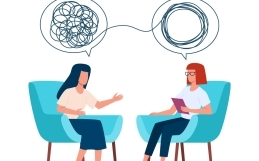“We all want to be liked, loved, or needed. That is fine. What is not fine is what we are willing to do to make sure we are liked, or loved or needed. When we make the needs and wants of others a priority in our lives, we devalue ourselves.”
– Lyanla Vanzant
If you’re reading this, I think we can both agree that you’re alive—but whether you’re truly living is something else altogether. There’s no greater tragedy than being alive but not feeling like it because you’re numb, aloof, and emotionless. This is what happens when your true self is anchored. You’re held down and stuck in one place, with no capacity to explore your own needs, wants, aspirations, or dreams. Just like an anchored boat, you might be able to see a destination, but can’t muster the strength to move in its direction.
When you lack a sense of identity, you tend to go through life as a selfless person who’s always accommodating others’ needs and wants. You lose yourself in your relationships, allowing other people to dictate your actions. This can lead you to believe that you must act in certain socially acceptable ways, even if they aren’t aligned with what you truly want for your life.
I get it. That’s how I lived most my life. But I broke the pattern when I came to realize that being a person with my own wants and needs was more important than accommodating other people’s needs all the time. When I realized that giving in all the time wasn’t working, and that the way I was acting didn’t come from a place of love, but rather from a place of guilt and inadequacy, I finally decided to release my anchor and set sail into life on my own terms. That’s when I started to navigate the uncharted territory of evolving from selfless to self-full. It’s when I began restructuring my entire life. If your sense of self is blurry and you tend to vanish in your relationships, it’s time to make some changes and start feeling alive. Here are some hints to help you start bringing your self into your relationships.
1. Understand That Other People Are Responsible for Themselves
Before I gained a sense of self, I commonly overlooked the important fact that other people are responsible for their own problems. I believed it was my responsibility to make other people feel better. For as long as I can remember, I played the caretaker role in my life; but all it got me was a burdening sense of obligation and crippling anxiety. You see, when you take on other people’s responsibilities, you’re allowing them to continue acting irresponsibly; you’re permitting and promoting their unhealthy patterns, leaving little to no room for yourself or your needs. The next time you’re inclined to take on someone else’s stuff, ask yourself, does doing so align with my true values? Is it actually kind to keep people from taking ownership of their own lives? You’re likely to the find that the answer is no. Once you realize this, you can begin exploring how to be supportive without taking over completely, leaving more room for your true self to grow.
2. Stop Trying to Keep the Peace
I often used to wonder why I was surrounded by selfish people; from my perspective, everyone else was the problem. But on my journey to creating a sense of self, I realized that they weren’t the problem. I was. By trying to keep the peace in my relationships, I was overlooking the ways in which other people were taking advantage of me. I ignored my needs, because I thought I should play nice all the time. It’s important to keep in mind that sometimes the better, more loving choice is the more uncomfortable, anxiety provoking one. Truly loving behavior calls for limits, boundaries, and saying no every once in a while so you can have room for your self to evolve and grow. Some people will get upset with you or throw a tantrum about it, but the cost of ignoring your boundaries is much greater than that. So stop thinking that keeping the peace is better for your relationships. The truth is, it’s much better to be honest and upfront, bringing your true self to the table.
3. Know the Consequences of Not Having a Balanced Self
Living your life without a self doesn’t allow you to truly live at all. When you’re constantly censoring yourself, you can’t see the freedom of choice you really have. The truth is, seeking to go with the flow all the time is a guaranteed way to keep your self from growing. My lack of self came from a belief that my identity depended on my being liked; if people didn’t like me, I didn’t feel worthy. The consequence of this was that my value as a person was totally dependent on what other people thought of me. Any criticism made me feel terrible about myself, so I avoided it by acting in ways that would gain others’ approval. I finally broke this pattern by placing more value on seeking approval from myself. By figuring out who I was and what I valued, I was able to create a more balanced sense of self. When you know who you are and accept yourself, you’re not as easily swayed by other people’s opinions.
4. Become Self-Full
If you’re caught up in making others a priority in your relationships, you probably think it’s selfish to consider your needs first. Once you shift your idea of what it means to be a good person, like I did, you’ll see it isn’t selfish—but rather self-full–to put yourself first. Much of my desire to change came from realizing that if I didn’t start valuing myself, my relationships would suffer. Although it might seem counterintuitive, prioritizing your needs and gaining a strong sense of self is actually better for other people, because it serves to strengthen the relationships you have with them. It’s for this reason that placing your needs first is self-full rather than selfish. It’s about seeing your value and knowing your worth as a person. When you do this, others can start seeing your value also, and your relationships can start to transform.
Final Thoughts
The journey toward bringing your self into your relationships is all about trial and error. It’s about making mistakes, changing your behaviors, and asserting your own decisions. I started to feel happy and truly alive when I started to get to know myself, learning when to say no and when to set limits in my relationships. It wasn’t easy. I had to get used to some criticism and disappointment; I had to grow a stronger backbone. However, I can say without hesitation that it was worth it. And I know it will be worth it for you, too. Your life should be lived the way you want to live it. No one should have the power over you to dictate how you need to live your life. The more you get to know who you are, and the more boldly you begin to live life on your terms, the better you’ll feel about yourself.
Did you enjoy reading this article?
Once a week I send out a newsletter with new articles and unique content for readers. It is my way of staying in touch with you and giving you free advice based on some important topics.
Click here to sign up for my newsletter
Talk soon,
Dr. Ilene
Article edited by Dr. Denise Fournier





Great article- one that I’ve painstakingly had to learn first hand step by step. This validated the process that I went through in learning to take better care of myself. Thanks!
Hi, Anon, Glad that you liked my article! Our greatest lessons are learned painstakingly.Great that you learned to take better care of yourself.
Thank you for this well written and insightful article. I started therapy a year and a half ago and it is one of the greatest decisions I have ever made for myself. Many people place the stigma of being abnormal or damaged to the idea of therapy when in fact it’s the opposite. It’s actually one of the most normal and healthiest endeavors you can make and if one is true to themselves then there is great benefit and reward in it.
Thank you, Charles! I appreciate you reading my article. I am happy you found value in it. That’s great that you go to therapy and find it has positively impacted your life. Thanks for sharing! One of my goals is to get rid of the stigma.